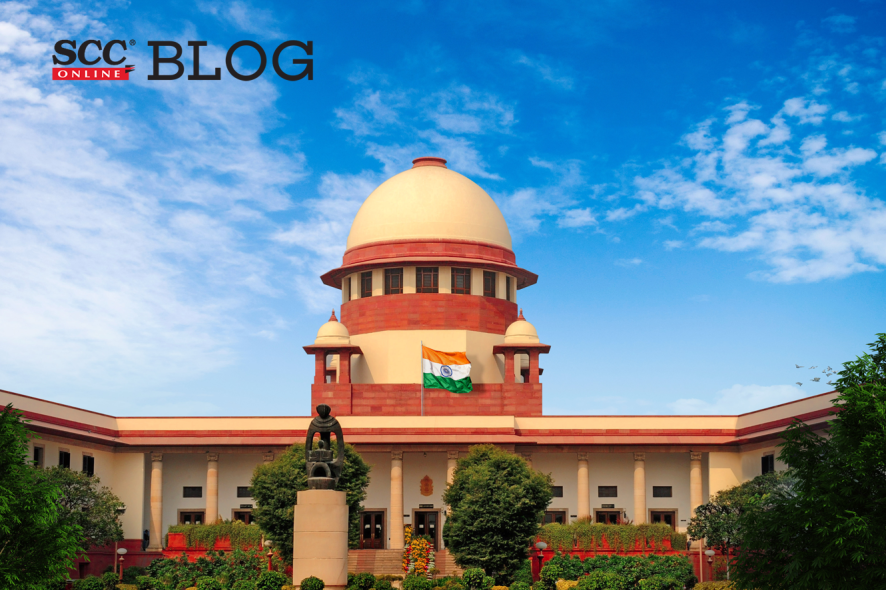Supreme Court: In a matter relating to the constitutional validity of 103rd Constitutional Amendment Act whichprovides for 10 percent reservation in appointments to posts under the State and in admissions to educational institutions to economically weaker sections (‘EWS’) of citizens, the five-judge bench of Dinesh Maheshwari, Bela M Trivedi, JB Pardiwala, JJ. upheld the constitutional validity of said amendment, whereas U.U. Lalit, CJ. and S. Ravindra Bhat, J. gave a dissenting opinion.
The Court framed three major issues for determination:
• Whether reservation is an instrument for inclusion of socially and educationally backward classes to the mainstream of society, and therefore reservation on economic criteria violated the basic structure of the Constitution?
The Court said that reservation is an instrument, an affirmative action by the State to ensure an all-inclusive march towards the goals of an egalitarian society while encountering inequalities. It is an instrument not only for the inclusion of socially and educationally backward classes to the mainstream society, but also for inclusion of any class or section, so disadvantaged as to be answering the rescription of the weaker section. Thus, reservation structures singularly on economic criteria does not violate any essential feature of constitution of India and does not cause any damage to the basic structure of the Constitution.
• Whether the exclusion of classes covered under Article 15 (4), 15(5) and 16(4) from getting benefit of reservation as economically weaker sections, violated the equality code and basic structure of the Constitution?
The Court held that being in the nation of balancing the requirement of non-discrimination and compensatory discrimination does not violate equality code or does not in any manner cause damage to the basic structure of the Constitution.
• Whether reservations for economically weaker sections of citizens up to 10 percent in addition to existing reservations, violated basic structure on account of the breach of the ceiling limit of 50 percent?
The Court held that reservations for economically weaker sections of citizens up to 10 percent in addition to existing reservations, does not violate basic structure on account of the breach of the ceiling limit of 50 percent, because that ceiling limit itself is not inflexible and in any case applies only to reservation relating to Article 15(4), 15(5) and 16(4) of the Constitution.
Dissent
Justice Ravindra Bhat said that the Constitution does not permit exclusion and that the amendment undermines the fabric of social justice, thereby the basic structure. He also stated that this amendment strikes at the heart of the equality code which is the core of the Constitution as the said amendment’s exclusionary mechanism operates against the socially disadvantaged class. Further, even if the exclusion is based on deprivation, it is discriminatory; thus, it destroys the equality code. Therefore, he observed that the said amendment is arbitrary and creates hostility for the socially disadvantaged.
Moreover, he stated that economic destitution and economic backwardness is the backbone of this amendment and on this account, the amendment is constitutionally indefeasible, however, excluding the classes such as SC, ST and OBC is not constitutionally permissible and violates the non-discriminatory and non-exclusionary facet of the equality code.
Further, permitting breach of 50% rule becomes a great way for further infractions which would result in compartmentalisation and then rule of reservation will become right to equality and take us back to State of Madras v. Champakam Dorairajan, 1951 SCC 351, since equality was to be a temporary aspect.
Further, stating that though economic criteria for accessing public goods is permissible, for discrimination, it is struck down as unconstitutional and becomes void on the ground that it is violative of the basic structure of the constitution. Thus, in the minority opinion, Justice Bhat struck down the constitutional validity of the Amendment. Justice UU Lalit concurred with his opinion.
[Janhit Abhiyan v. Union of India, Writ Petition (C)No. 55/2019, decided on 07-11-2022]







